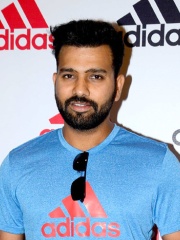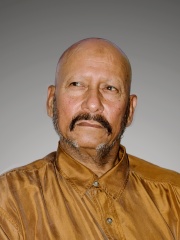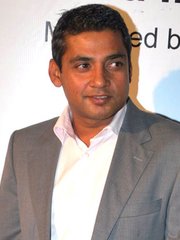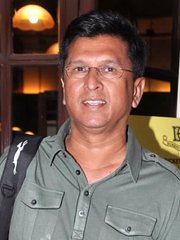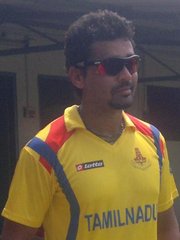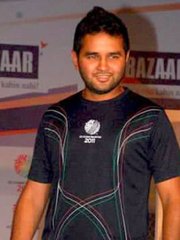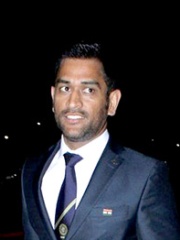
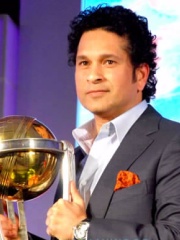
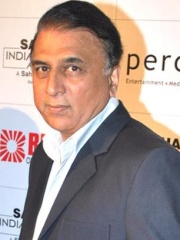
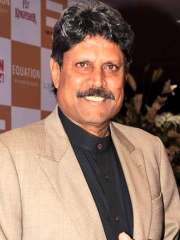
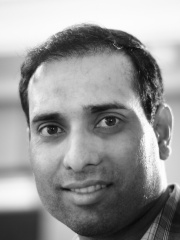
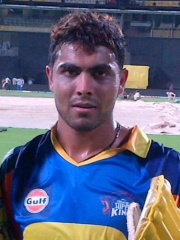
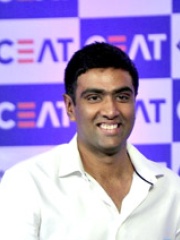
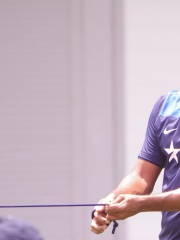
The Most Famous
CRICKETERS from India
This page contains a list of the greatest Indian Cricketers. The pantheon dataset contains 136 Cricketers, 72 of which were born in India. This makes India the birth place of the most number of Cricketers.
Top 10
The following people are considered by Pantheon to be the top 10 most legendary Indian Cricketers of all time. This list of famous Indian Cricketers is sorted by HPI (Historical Popularity Index), a metric that aggregates information on a biography's online popularity. Visit the rankings page to view the entire list of Indian Cricketers.

1. MS Dhoni (b. 1981)
With an HPI of 57.69, MS Dhoni is the most famous Indian Cricketer. His biography has been translated into 41 different languages on wikipedia.
Mahendra Singh Dhoni ([məˈɦeːnd̪ɾə ˈsɪŋɡʱ ˈd̪ʱoːniː] ; born 7 July 1981) is an Indian professional cricketer who plays as a right-handed batter and a wicket-keeper. Widely regarded as one of the most prolific wicket-keeper batsmen and captains, he represented the Indian cricket team and was the captain of the side in limited overs formats from 2007 to 2017 and in Test cricket from 2008 to 2014. Dhoni has captained the most international matches and is the most successful Indian captain. He has led India to victory in the 2007 ICC World Twenty20, the 2011 Cricket World Cup, and the 2013 ICC Champions Trophy, being the only captain to win three different limited overs ICC tournaments. He also led the teams that won the Asia Cup in 2010 and 2016, and he was a member of the title winning squad in 2018. Born in Ranchi, Dhoni made his first class debut for Bihar in 1999. He made his debut for the Indian cricket team on 23 December 2004 in an ODI against Bangladesh and played his first test a year later against Sri Lanka. In 2007, he became the captain of the ODI side before taking over in all formats by 2008. Dhoni retired from Test cricket in 2014 but continued playing in limited overs cricket till 2019. He has scored 17,266 runs in international cricket including 10,000 plus runs at an average of more than 50 in ODIs. In the Indian Premier League (IPL), Dhoni plays for Chennai Super Kings (CSK), leading them to the final on ten occasions and winning it five times (2010, 2011, 2018, 2021 and 2023) jointly sharing this title with Rohit Sharma . He has also led CSK to two Champions League T20 titles in 2010 and 2014. Dhoni is among the few batsmen to have scored more than five thousand runs in the IPL, as well as being the first wicket-keeper to do so. In 2008, Dhoni was awarded India's highest sport honour Major Dhyan Chand Khel Ratna Award by Government of India. He received the fourth highest civilian award Padma Shri in 2009 and third highest civilian award Padma Bhushan in 2018. Dhoni holds an honorary rank of Lieutenant colonel in the Parachute Regiment of the Indian Territorial Army which was presented to him by the Indian Army in 2011. In June 2025, he was inducted into ICC Cricket Hall of Fame.

2. Sachin Tendulkar (b. 1973)
With an HPI of 53.22, Sachin Tendulkar is the 2nd most famous Indian Cricketer. His biography has been translated into 70 different languages.
Sachin Ramesh Tendulkar ( ; Marathi: [sətɕin t̪eɳɖulkəɾ]; born 24 April 1973) is an Indian former international cricketer who captained the Indian national team. Often dubbed the "God of Cricket" in India, he is widely regarded as one of the greatest cricketers of all time. He holds several world records, including being the all-time highest run-scorer in international cricket, receiving the most player of the match awards in international cricket, and being the only batsman to score 100 international centuries. Tendulkar was a Member of Parliament, Rajya Sabha by presidential nomination from 2012 to 2018. Tendulkar took up cricket at the age of eleven, made his Test match debut on 15 November 1989 against Pakistan in Karachi at the age of sixteen, and went on to represent Mumbai domestically and India internationally for over 24 years. In 2002, halfway through his career, Wisden ranked him the second-greatest Test batsman of all time, behind Don Bradman, and the second-greatest ODI batsman of all time, behind Viv Richards. The same year, Tendulkar was a part of the team that was one of the joint-winners of the 2002 ICC Champions Trophy. Later in his career, Tendulkar was part of the Indian team that won the 2011 Cricket World Cup, his first win in six World Cup appearances for India. He had previously been named "Player of the Tournament" at the 2003 World Cup. Tendulkar has received several awards from the government of India: the Arjuna Award (1994), the Khel Ratna Award (1997), the Padma Shri (1998), and the Padma Vibhushan (2008). After Tendulkar played his last match in November 2013, the Prime Minister's Office announced the decision to award him the Bharat Ratna, India's highest civilian award. He was the first sportsperson to receive the award and, as of 2024, is the youngest recipient. Having retired from ODI cricket in 2012, he retired from all forms of cricket in November 2013 after playing his 200th Test match. Tendulkar played 664 international cricket matches in total, scoring 34,357 runs. In 2013, Tendulkar was included in an all-time Test World XI to mark the 150th anniversary of Wisden Cricketers' Almanack, and he was one of only two specialist batsmen of the post–World War II era, along with Viv Richards, to get featured in the team. Tendulkar is regarded as a symbol of national pride in India for his achievements. In 2010, Time included Tendulkar in its annual list of the most influential people in the world. Tendulkar was awarded the Sir Garfield Sobers Trophy for cricketer of the year at the 2010 International Cricket Council (ICC) Awards. In 2019, he was inducted into the ICC Cricket Hall of Fame.

3. Sunil Gavaskar (b. 1949)
With an HPI of 51.56, Sunil Gavaskar is the 3rd most famous Indian Cricketer. His biography has been translated into 29 different languages.
Sunil Manohar "Sunny" Gavaskar (Marathi pronunciation: [suniːl ɡaːʋəskəɾ]; born 10 July 1949), is a former captain of the Indian national cricket team who represented India and Mumbai from 1971 to 1987. He was the first batsman to pass 10,000 runs in Test cricket. Gavaskar is acknowledged as one of the greatest opening batsmen of all time. Gavaskar was widely admired for his technique against fast bowling, with a particularly high average of 65.45 against the West Indies, who possessed a four-pronged fast bowling attack, widely regarded as the most vicious in Test history. However, most of Gavaskar's centuries against West Indies were against the team when their four-pronged attack were not playing together. His captaincy of the Indian team, was considered as one of the first attacking ones, with Indian team winning the 1984 Asia Cup, and the World Championship of Cricket in 1985. At the same time, there were multiple exchanges of captaincy between Gavaskar and Kapil Dev, with one coming just six months before Kapil led India to victory at the 1983 Cricket World Cup. He is also a former Sheriff of Mumbai. Gavaskar is a recipient of the Indian sports honour of the Arjuna Award and the civilian honour of the Padma Bhushan. He was inducted into the ICC Cricket Hall of Fame in 2009. In 2012, he was awarded the C. K. Nayudu Lifetime Achievement Award, the highest honour BCCI can bestow on a former player. Gavaskar is also known as Sunny [1] by his fans and fellow cricket commentators.

4. Kapil Dev (b. 1959)
With an HPI of 49.72, Kapil Dev is the 4th most famous Indian Cricketer. His biography has been translated into 32 different languages.
Kapildev Ramlal Nikhanj (pronunciation: [kəpil deːʋ] born 6 January 1959) is an Indian former cricket team captain. He is regarded as one of the greatest all-rounders in the history of cricket, he was a fast-medium bowler and a hard-hitting middle-order batsman. Dev is the only player in the history of cricket to have taken more than 400 wickets (434 wickets) and scored more than 5,000 runs in Test cricket. Dev captained the Indian cricket team that won the 1983 Cricket World Cup, becoming the first Indian captain to win the Cricket World Cup. He is still the youngest captain (at the age of 24) to win the World Cup for any team. He retired in 1994, as the first player to take 200 ODI wickets, and holding the world record for the highest number of wickets taken in Test cricket, a record subsequently broken by Courtney Walsh in 2000. Kapil Dev held the record for the highest individual score (175*) scored by a batsman batting at number 5 or lower in ODIs until 2023, when it was superseded by Glenn Maxwell. He was also a part of the Indian squad which won the 1985 World Championship of Cricket. After retiring, he coached the Indian national team between September 1999 and September 2000. In 1982, Dev was awarded the Padma Shri, and in 1991 the Padma Bhushan. In 2002, he was named by Wisden as the Indian Cricketer of the Century. On 11 March 2010, Dev was inducted into the ICC Cricket Hall of Fame. In 2013, he received the C. K. Nayudu Lifetime Achievement Award, the highest honour conferred by BCCI on a former player.
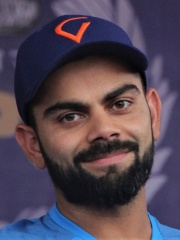
5. Virat Kohli (b. 1988)
With an HPI of 49.39, Virat Kohli is the 5th most famous Indian Cricketer. His biography has been translated into 52 different languages.
Virat Kohli (born 5 November 1988) is an Indian international cricketer and the former all-format captain of the Indian national cricket team. He is a right-handed batter and occasional right-arm medium pace bowler. Considered one of the greatest all-format batsmen in the history of cricket, he has been nicknamed the King, the Chase Master, and the Run Machine for his skills, records and ability to lead his team to victory. Kohli has the most centuries in ODIs and the second-most centuries in international cricket with 84 tons across all formats. He is also the leading run-scorer in the Indian Premier League. Kohli is the most successful Test captain of India with most wins and 3 consecutive Test mace retainments. He is the only batter to earn 900+ rating points across all 3 formats. Kohli was the captain of the 2008 U19 World Cup winning team and was a crucial member of the teams that won 2011 ODI World Cup, 2013 Champions Trophy, 2024 T20 World Cup, and 2025 Champions Trophy. He plays for Royal Challengers Bengaluru in the Indian Premier League and for Delhi in domestic cricket. In 2013, Kohli was ranked number one in the ODI batting rankings. In 2015, he achieved the same in T20I. In 2018, he was ranked number one in Test, making him the only Indian to hold the number one spot in all three formats. He is the first player to score 20,000 runs in a decade. He was the Cricketer of the Decade for 2011 to 2020. Kohli has won ten ICC Awards, making him the most awarded player in international cricket history. He won the ODI Player of the Year award four times in 2012, 2017, 2018, and 2023. He won the Cricketer of the Year award, on two occasions, in 2017 and 2018. In 2018, he became the first player to win all three major awards including Cricketer of the Year, ODI Player of the Year and Test Player of the Year in the same year. He was honored with the Spirit of Cricket Award in 2019 and given the Cricketer of the Decade and ODI Cricketer of the Decade in 2020. Kohli was named the Wisden Leading Cricketer in the World for three consecutive years. Kohli has the most Player of the Series and second most Player of the Match awards to his name in all three formats combined. He was honoured with the Arjuna Award in 2013, the Padma Shri in 2017, and India's highest sporting honour, the Khel Ratna Award, in 2018. Time included him on its 100 most influential people in the world list in 2018. Kohli has been deemed one of the most commercially viable athletes, with estimated earnings of ₹634 crore (US$75 million) in the year 2022. After winning the 2024 T20 World Cup and winning the Player of the Match award in the final, Kohli announced his retirement from T20Is. On 12 May 2025, aged 36, he announced his retirement from the Test format. He is married to actress Anushka Sharma, and they have two children.

6. VVS Laxman (b. 1974)
With an HPI of 47.41, VVS Laxman is the 6th most famous Indian Cricketer. His biography has been translated into 17 different languages.
Vangipurapu Venkata Sai Laxman (; born 1 November 1974) is an Indian former international cricketer and a former cricket commentator and pundit. A right-handed batsman known for his elegant stroke play, Laxman played as a middle-order batsman in Test cricket. Laxman is currently the Head of Cricket at the National Cricket Academy (NCA), and the head coach of the India Under-19 and India A teams. Laxman was a member of the Indian team that was one of the joint-winners of the 2002 ICC Champions Trophy, the title being shared with Sri Lanka. Laxman is one of the few players to have played 100 Test matches, without ever appearing in a Cricket World Cup. Despite being a relatively slow runner between the wickets, Laxman compensated with his stroke play and fast scoring. In 2002, he was named one of Wisden's five Cricketers of the Year. He was considered to be a part of the original "Fab Four" In domestic cricket, Laxman represented Hyderabad. He also played for Lancashire in county cricket. He was also the captain of the Deccan Chargers team in the Indian Premier League during its inaugural season. Later, he played for the Kochi Tuskers team. He was the mentor of the Sunrisers Hyderabad until 2021. He is popularly called the 'God of 4th Innings' for his exploits in Tests. In 2011, Laxman was awarded the Padma Shri award, India's fourth highest civilian award. In 2012, he retired from international cricket.

7. Ravindra Jadeja (b. 1988)
With an HPI of 46.72, Ravindra Jadeja is the 7th most famous Indian Cricketer. His biography has been translated into 23 different languages.
Ravindrasinh Anirudhsinh Jadeja (born 6 December 1988) is an Indian cricketer who represents the India national team currently in ODI and Test formats. He is an all-rounder, who bats left-handed and bowls left-arm orthodox spin. He is widely regarded as one of the greatest all-rounders and among the finest fielders of his generation. He represents Saurashtra in domestic cricket and Rajasthan Royals in the Indian Premier League. Jadeja was a crucial member of the Indian teams that won the 2013 and 2025 ICC Champions Trophy, becoming leading wicket-taker and player of the final in the former and hitting the winning boundary in the latter final. He was also a part of the Indian squad that won the 2024 ICC T20 World Cup, after which he announced his retirement from T20Is. Jadeja was vice-captain of the Indian U-19 cricket team that won the World Cup in Malaysia in 2008, under the captaincy of former Indian captain Virat Kohli. He made his ODI debut against Sri Lanka on 8 February 2009 and scored an unbeaten 60 off 77 balls in that match. However, his Test debut came almost four years later, on 13 December 2012, against England at Nagpur. Jadeja was bought for $2 million by the Chennai Super Kings at the 2012 IPL Players Auction. He was bought by the Gujarat Lions in the 2016 IPL Players Auction for ₹9.5 crores after the Chennai Super Kings were banned from the IPL for two seasons. On 22 January 2017, Jadeja became the first Indian left-arm spinner to take 150 One Day International wickets, when he dismissed Sam Billings at Eden Gardens, Kolkata. In March 2017, he became the top ranked bowler in the world leaving behind Ravichandran Ashwin who held that position for a long time. He was announced as captain of the Chennai Super Kings IPL franchise, for the 2022 IPL season, succeeding MS Dhoni. He however stepped down in the middle of the season.

8. Ravichandran Ashwin (b. 1986)
With an HPI of 46.31, Ravichandran Ashwin is the 8th most famous Indian Cricketer. His biography has been translated into 22 different languages.
Ravichandran Ashwin (Tamil: [ɾaʋitɕand̪iɾan aɕʋin]; ) (born 17 September 1986) is an Indian cricketer. He is a right-arm off spin bowler and a lower order batter. Widely regarded as one of the most prolific spinners of all time, he represented the Indian cricket team and was part of the Indian team that won the 2011 Cricket World Cup and the 2013 Champions Trophy. He represented Tamil Nadu and South Zone in domestic cricket. Ashwin has taken more than 500 wickets in Tests and was the fastest bowler to reach 300 test wickets in terms of number of innings. He has won eleven Man of the Series awards in Tests, which is the most for any cricketer, along with Muttiah Muralitharan. As an all-rounder in Test cricket, he bats down the order, has scored six Test centuries and is one of the only three players to have scored 3000 runs and taken 500 wickets in Tests. He had been the highest-ranked bowler in the ICC men's player rankings multiple times, and holds the record for the second highest rating points by an Indian bowler ever in Test cricket. Ashwin started as an opening batsman but dropped down the order due to limited success and turned into an off-break bowler. He made his first-class debut for Tamil Nadu in December 2006 and captained the team the following season. He played for the Chennai Super Kings (CSK) in the 2010 Indian Premier League, where his economical bowling led to his maiden international call-up in the limited-overs formats in June 2010. He was the leading wicket-taker and player of the tournament of the 2010 Champions League Twenty20, which was won by CSK. He also won the 2014 Champions League Twenty20 and two IPL titles (2010, 2011) with CSK. In 2011, Ashwin made his Test debut against West Indies and became the seventh Indian bowler to take a five-wicket haul on debut. He had greater success with the turning tracks in the Indian subcontinent, including taking 29 wickets in a series against Australia, the most by any Indian bowler in a four-match Test series. In the 2015–16 season, he took 48 wickets and scored 336 runs in eight Test matches, along with 27 wickets in 19 T20Is, enabling him to win the ICC Cricketer of the Year and ICC Men's Test Cricketer of the Year awards for 2016. He has been named five times to the ICC Men's Test Team of the Year and was named in the ICC Men's Test Team of the Decade 2011–20. In 2015, he was awarded the Arjuna award by the Government of India. On 18 December 2024, Ashwin announced his retirement from all forms of international cricket. He was awarded the Padma Shri, the fourth highest civilian award, by the Government of India in January 2025.

9. Mohammed Shami (b. 1990)
With an HPI of 45.88, Mohammed Shami is the 9th most famous Indian Cricketer. Her biography has been translated into 20 different languages.
Mohammed Shami (Hindi: [ʃʌmiː]; born 3 September 1990) is an Indian international cricketer who plays as a right-arm fast-bowler, for the India national cricket team and for the Bengal in domestic cricket and for the Lucknow Super Giants in the Indian Premier League. He also plays for Mohun Bagan in domestic competitions of West Bengal. One of the most consistent wicket takers in contemporary world cricket, Shami bowls the ball off the seam and uses swing, including reverse swing, to move the ball both directions. He has been reputed to have an edge in the death overs of a limited-overs innings and, in all formats, has been described as being at times "unplayable". Shami finished as the tournament's leading wicket taker in the ICC World Cup 2023, besides being the fastest bowler to take 50 wickets in the 48 years history of Cricket World Cup spanning 13 editions. He is recipient of 2023 Arjuna Award for Cricket. Having taken 7 wickets for 57 runs against New Zealand in the 2023 Cricket World Cup semi final, he holds the record for the best figures for an Indian Bowler in ODIs, and is currently, the only Indian bowler to have taken 7 wickets in an ODI innings. Shami was a member of the Indian team that won the 2025 ICC Champions Trophy.
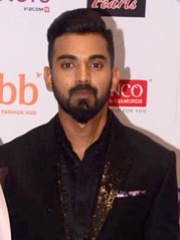
10. K. L. Rahul (b. 1992)
With an HPI of 45.67, K. L. Rahul is the 10th most famous Indian Cricketer. His biography has been translated into 23 different languages.
Kannaur Lokesh Rahul (Kannada: [kaɳːuːɾ loːkeːʃ ɾaːhul]; born 18 April 1992) is an Indian international cricketer. He plays for the Indian national team as a right-handed wicket-keeper batter. Rahul represents Karnataka in domestic cricket and Delhi Capitals in the Indian Premier League. Rahul made his international debut in 2014 against Australia in the Boxing Day Test in Melbourne. Two years after his Test debut, Rahul made his One-Day International debut in 2016 against Zimbabwe, where he scored his first century by hitting a six on the last ball to reach 100* (115) from 94 (114), which was also the only six of the entire match. Rahul is the first and only Indian cricketer to score an ODI century on his debut. On the same tour, he made his T20I debut.
People
Pantheon has 72 people classified as Indian cricketers born between 1946 and 2004. Of these 72, 71 (98.61%) of them are still alive today. The most famous living Indian cricketers include MS Dhoni, Sachin Tendulkar, and Sunil Gavaskar. The most famous deceased Indian cricketers include Bishan Singh Bedi. As of April 2024, 24 new Indian cricketers have been added to Pantheon including Ajay Jadeja, Kiran More, and Vinod Kambli.
Living Indian Cricketers
Go to all RankingsMS Dhoni
1981 - Present
HPI: 57.69
Sachin Tendulkar
1973 - Present
HPI: 53.22
Sunil Gavaskar
1949 - Present
HPI: 51.56
Kapil Dev
1959 - Present
HPI: 49.72
Virat Kohli
1988 - Present
HPI: 49.39
VVS Laxman
1974 - Present
HPI: 47.41
Ravindra Jadeja
1988 - Present
HPI: 46.72
Ravichandran Ashwin
1986 - Present
HPI: 46.31
Mohammed Shami
1990 - Present
HPI: 45.88
K. L. Rahul
1992 - Present
HPI: 45.67
Rohit Sharma
1987 - Present
HPI: 44.51
Syed Kirmani
1949 - Present
HPI: 43.49
Deceased Indian Cricketers
Go to all RankingsNewly Added Indian Cricketers (2025)
Go to all RankingsAjay Jadeja
1971 - Present
HPI: 37.02
Kiran More
1962 - Present
HPI: 35.03
Vinod Kambli
1972 - Present
HPI: 34.83
Nilima Jogalekar
1961 - Present
HPI: 33.91
Nayan Mongia
1969 - Present
HPI: 33.55
Ishan Kishan
1998 - Present
HPI: 31.16
Murali Vijay
1984 - Present
HPI: 29.80
Shardul Thakur
1991 - Present
HPI: 29.42
Parthiv Patel
1985 - Present
HPI: 29.24
Mohit Sharma
1988 - Present
HPI: 28.46
Kedar Jadhav
1985 - Present
HPI: 28.43
Manish Pandey
1989 - Present
HPI: 27.62

